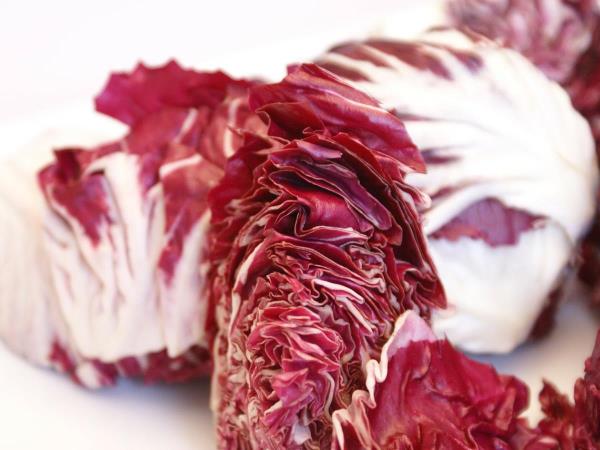What exactly is chicory and why do we value it?
Chicory is a vegetable that belongs to the chicory family (yes, that's the plant our ancestors used to make coffee substitutes in times when coffee was not abundant). Its taste is slightly bitter, which is not a flaw - quite the opposite! Bitterness in foods is a sign of the presence of numerous beneficial substances.
The bitterness in chicory is caused by substances that promote liver function, digestion, and body cleansing. In fact, old folk wisdom said that if you want to purify the blood (which in translation means to improve health and immunity), bitter food is indispensable.
Interestingly, in Italy, where the most famous varieties of red chicory originate, it was noticed centuries ago that consuming chicory brings more energy and fewer digestive issues.
What benefits does chicory bring?
Although chicory may appear modest, its composition fascinates modern researchers as well ... Chicory contains a whopping 3537 units of antioxidants per 100 grams (measured by the ORAC method - a way of measuring substances' capability to scavenge free radicals). For comparison: spinach has around 1500, broccoli has approximately 890. This means that chicory more than doubles the amount of antioxidants compared to many other types of vegetables!
What does this mean for you? Antioxidants are our little invisible heroes - they protect the body from damages caused by free radicals. They are responsible for premature aging, heart diseases, type 2 diabetes, and even cancer.
In addition to antioxidants, chicory contains:
- Vitamin C, which strengthens the immune system.
- Vitamin A, important for eye and skin health.
- Vitamin E, which protects cells from damage.
- B-complex vitamins (B1, B2, B3, and B6), which support a healthy nervous system and metabolism.
We must not forget about minerals since chicory offers plenty of zinc, copper, and magnesium - three key minerals that aid in tissue regeneration, immune system strengthening, and blood pressure regulation.
A study published in the journal Frontiers in Pharmacology in 2020 showed that regular chicory consumption improves liver function by 23% over eight weeks.
How does chicory affect metabolism and weight loss?
If you are struggling with excess weight, chicory is your ally. Due to its high fiber content, it fills you up quickly, while containing very few calories - only 23 calories per 100 grams.
The fiber in chicory not only fills the stomach but also regulates blood sugar by slowing the absorption of glucose into the blood. This results in fewer energy fluctuations and fewer sudden hunger pangs.
Additionally, chicory contains a special substance called inulin. If you haven't heard of inulin - it is a type of fiber that acts as a prebiotic in the body. Prebiotics are food for the good bacteria in our intestines, which are crucial for digestive health, the immune system, and even mood.
Studies published in the Journal of Nutrition have shown that consuming inulin reduces belly fat and improves insulin sensitivity.
Chicory and heart health
According to the World Health Organization (WHO), cardiovascular diseases are still the leading cause of death worldwide. And this is where chicory proves to be an excellent support.
Its phytonutrients, such as lycopene, ellagic acid, and quercetin (all natural cell protectors), help lower blood pressure, reduce inflammation, and protect blood vessels.
Quercetin (in case you didn't know, it's a natural plant pigment) has the ability to reduce blood clots and improve blood flow. Interestingly, there is more quercetin in one head of chicory than in an average apple!
Chicory for better digestion and detoxification
Our body absorbs small amounts of toxins every day through food, water, and air. The liver is responsible for cleansing, and chicory effectively aids in this process.
Its bitterness, mainly the compound lactucin (a natural bitter substance found in chicory), stimulates the secretion of bile, which is crucial for fat breakdown. Additionally, bile helps remove excess cholesterol from the body.
Healers used to say: Where there is bitterness, there are happy livers. And they were right.
Chicory, Olive, and Parmesan Salad
Since we also promised you something tasty, we are delighted to present you with a simple recipe that will tantalize your taste buds.
You Will Need:
- 1 small head of chicory
- 1 cup green olives
- 2 tablespoons olive oil
- 1 tablespoon balsamic vinegar
- 1 tablespoon honey
- 60 grams grated parmesan (or Grana Padano cheese)
- a pinch of salt and pepper
- some lettuce leaves as a base
Preparing it is simple, but the secret lies in gentleness. Remove the tough outer leaves from the chicory, cut out the core, and tear the leaves into bite-sized pieces. Clean and halve the olives.
In a small bowl, prepare the dressing: mix olive oil, balsamic vinegar, a tablespoon of olive water, and honey. Season with salt and pepper to taste.
Just before serving, drizzle the salad with the dressing, gently toss, and sprinkle with grated cheese. For added freshness, you can place some lettuce leaves under the salad.
The result? A salad that is not only tasty but a true little healing bomb!
In conclusion, we encourage you to look for chicory on your next visit to the market or health food store. Whether you prepare it fresh, grilled, or in a risotto, you will give it the opportunity to invigorate your body, enhance your digestion, and delight your heart.
And, as the wise old men said: Let your food be your medicine, and let food be your medicine.









 Would you like to be informed about news on the website?
Would you like to be informed about news on the website?

